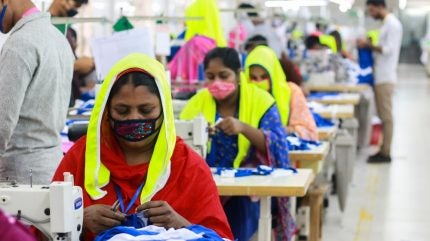
The study titled “Regulatory Framework to Enable Recycling of Post-Industrial Waste (Jhut) for the RMG Industry in Bangladesh” was jointly conducted by the Gesellschaft für Internationale Zusammenarbeit (GIZ) GmbH and Swedish retailer H&M under the programme for Sustainability in the Textile and Leather Sector.
The study states the recycling industry in Bangladesh faces several key challenges, including sorting Jhut, timely disposal, boosting productivity, and minimising waste through improved design.
Bangladesh’s current recycling capacity for apparel-grade recycled yarns ranged from 18,000 to 24,000 tonnes annually, according to the findings.
This only represents a modest 5 – 7% of the expansive 330,000 – 500,000 tonnes of 100% cotton and cotton-elastane waste produced every year.
Less than 5% of waste is upcycled, with over 55% exported to recycling companies, remaining waste is downcycled, incinerated, and landfilled.
“In Bangladesh, comprehensive data regarding Jhut waste remains incomplete,” says the report.

US Tariffs are shifting - will you react or anticipate?
Don’t let policy changes catch you off guard. Stay proactive with real-time data and expert analysis.
By GlobalDataTo harness its potential for innovation and industrial advancement through the circular economy, the study suggests the textile sector must formalise the informal Jhut sector as it claims Bangladesh has been missing out on a potential export business of recycled textile products worth $4-5bn per year.
It outlines four measures and regulatory reforms necessary to establish an effective management framework for Jhut recycling, aiming to maximise economic, social and environmental benefits within Bangladesh’s Jhut supply chain.
- Collaborative stakeholder engagement: There is a critical need for enhanced collaboration among key stakeholders, including government bodies, manufacturers, NGOs, and recycling companies. Joint efforts are essential in developing and implementing sustainable infrastructure, adopting innovative technology, and establishing efficient waste management systems. This collaborative approach would facilitate the sharing of resources, expertise, and responsibility, leading to more impactful results.
- Protection of workers’ rights and safety: The report stresses the importance of enforcing existing labour laws and introducing new regulations to safeguard the rights and safety of workers in the Jhut recycling industry. This includes ensuring proper occupational health and safety standards, eliminating child labour, and addressing gender-based challenges. Strengthening these protections will not only improve working conditions but also contribute to the overall well-being and dignity of the workforce, which is crucial for sustainable industry practices.
- Promotion of circular textile economy practices: Encouraging the adoption of a circular economy within the textile industry is vital. Brands and suppliers need to take the lead in this transformation by incorporating recycled materials into their product lines, thereby setting an industry standard for sustainable production. This approach will not only help in reducing waste but also in fostering consumer awareness and demand for eco-friendly products. The promotion of circular economy principles will drive innovation and open new markets for recycled products, contributing to both environmental sustainability and economic growth.
- Capacity building and technology adaptation: Investing in the development of advanced recycling technologies and building the capacity of local enterprises is essential for the effective management of Jhut. This includes training programmes for workers, technological upgrades in recycling processes, and research into new methods of waste conversion. Such initiatives would improve the quality and efficiency of recycling, reduce environmental impact, and enhance the competitiveness of the Bangladeshi textile industry in the global market. In recent years, Bangladesh has seen various initiatives aimed at attracting innovative recycling technologies. challenges persist, including insufficient transparency, particularly within the informal sector.
The report also runs down several key policy solutions for the informal Jhut sector, including improving data availability, transparency, and traceability through a national Jhut database, introducing industry guidelines for Jhut management and recycling standards and revising VAT and tariff rules for Jhut transactions.
It also suggested providing economic incentives to formalise Jhut collection, handling, and sorting, establishing central depository systems and cluster-based sorting hubs to promote decent work and social inclusion and enhancing the investment environment for advanced recycling technologies.



